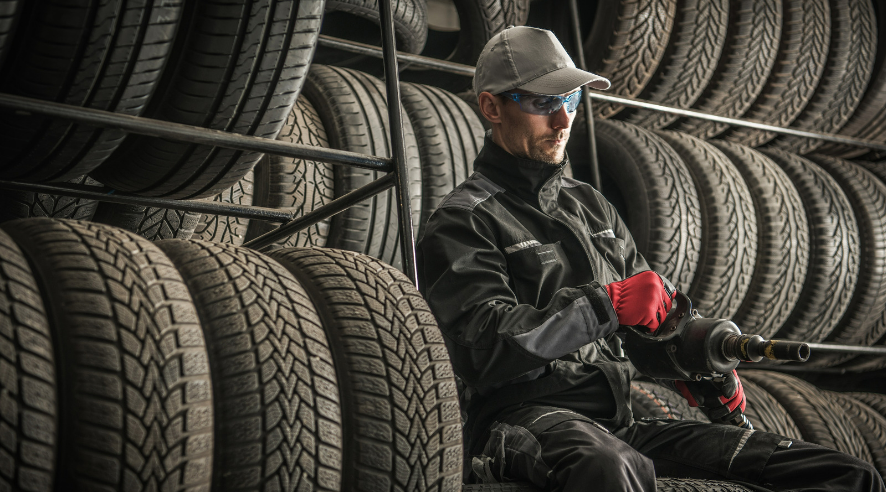Maximizing Your Car's Tires: The Ultimate Guide to Longevity and Performance
- 25 November 2022

As a driver, your car's tires are one of the most essential components to consider for both safety and performance. Tires play a crucial role in providing traction and stability, particularly when driving on slippery roads or navigating sharp turns. However, many drivers often neglect their tires and only consider them when it's time for a replacement. But did you know that with proper maintenance and regular checks, you can extend the life of your tires and improve your driving experience?
Here are some essential tips for maximizing your car's tires:
Regularly check your tire pressure:
Maintaining proper tire pressure is crucial for several reasons. First, it ensures optimal performance by allowing your tires to maintain their shape, which enhances handling and stability. Secondly, it helps reduce fuel consumption, as underinflated tires can increase rolling resistance and reduce your vehicle's fuel efficiency. Lastly, proper tire pressure can extend the life of your tires by reducing the likelihood of excessive wear and tear. You can easily check your tire pressure using a tire pressure gauge and referring to the manufacturer's recommended pressure level.
Regular tire pressure checks are essential for maximizing the performance of your car's tires. Improper tire pressure can cause several issues, including reduced handling, increased fuel consumption, and decreased tire life. Checking tire pressure is simple and straightforward and can be done using a tire pressure gauge. Always check the pressure when your tires are cold, as driving can cause a slight increase in tire pressure. Additionally, it's important to note that tire pressure can be affected by temperature changes, so make sure to check your tires regularly, especially during extreme weather conditions.
Rotate your tires regularly:
Rotating your tires regularly helps ensure that they wear evenly and reduces the risk of premature tread wear. This, in turn, helps extend the life of your tires and improves your driving experience. The recommended rotation frequency depends on the type of vehicle and tire you have, but most experts recommend rotating tires every 5,000 to 8,000 miles.
Rotating your tires is another crucial aspect of tire maintenance. Regular tire rotation helps to ensure that your tires wear evenly, which can extend their life. Uneven tire wear can cause several issues, including reduced handling and stability, and decreased fuel efficiency. The recommended rotation frequency for your tires depends on your vehicle and tire type, so make sure to refer to your vehicle's manufacturer's guidelines. When rotating your tires, it's essential to check their balance and alignment, as this can also impact their performance and longevity.
Balance and align your tires:
Balancing your tires ensures that they are evenly weighted, which helps prevent uneven wear and tear. Similarly, proper alignment ensures that your tires are pointing in the right direction and reduces the risk of excessive tire wear, improved handling, and stability. A good rule of thumb is to have your tires balanced and aligned every time you have them rotated.
Balancing and aligning your tires is essential for improving their performance and extending their life. Unbalanced tires can cause excessive vibration, which can lead to uneven wear and reduced handling. Proper tire alignment ensures that your tires are pointed in the right direction and can help reduce the risk of excessive tire wear, improve handling, and increase stability. Balancing and aligning your tires should be done every time you have your tires rotated.
Avoid overloading your vehicle:
Overloading your vehicle can put excessive stress on your tires, which can result in increased wear and tear. Furthermore, it can reduce your vehicle's stability and handling, particularly when driving at high speeds. Always refer to your vehicle's manufacturer's guidelines for maximum load capacity and avoid exceeding it.
Overloading your vehicle can cause excessive stress on your tires and reduce their performance and longevity. Additionally, it can reduce your vehicle's stability and handling, particularly when driving at high speeds. Always make sure to follow your vehicle's manufacturer's guidelines for maximum load capacity, and avoid exceeding it. If you're planning to carry a heavy load, make sure to adjust your tire pressure accordingly to compensate for the extra weight.
Invest in high-quality tires:
Finally, investing in high-quality tires is essential for maximizing your car's tires' performance and longevity. High-quality tires offer better handling and stability, improved traction, and increased fuel efficiency. Additionally, they are designed to last longer and are more resistant to punctures, cuts, and other forms of damage.
Investing in high-quality tires is essential for maximizing your car's tire performance and longevity. High-quality tires offer several benefits, including improved handling and stability, increased traction, and reduced fuel consumption. Additionally, they are designed to last longer and are more resistant to punctures, cuts, and other forms of damage. When choosing new tires, make sure to consider your driving needs and conditions, as well as your vehicle's manufacturer's recommendations.
In conclusion, maximizing your car's tires requires a combination of proper maintenance, regular checks, and investing in high-quality tires. By following these tips, you can extend the life of your tires, improve your driving experience, and reduce the risk of tire-related incidents. So, take the time to care for your tires, and you'll be rewarded with improved performance and longevity.




